

A-Z Artist Index Compilations Record Labels Media
Help Us! Contact Us Resources Timeline


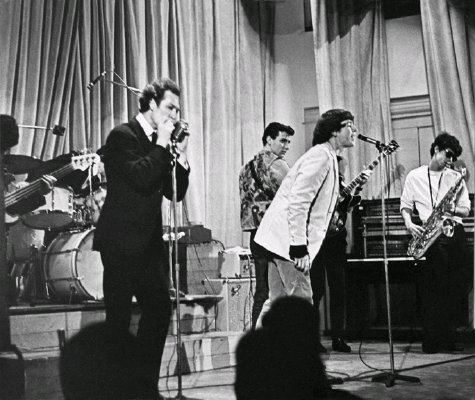
Bio:
The Alpine Seven were a Dublin-based showband with several notable musicians
including Mick Molloy (lead guitar), Deke O'Brien (rhythm guitar), Gerry Ryan (bass)
and Ian McGarry (drums), all of whom played a huge role in the development of a
rock scene in Ireland though their involvement in Bluesville.
Ian Whitcomb was an English undergraduate studying at Trinity College Dublin in
1961 who could play piano like Jerry Lee Lewis, had a high
pitched vocal style, and was interested in jazz, blues and early rock'n'roll.
Through local jazz circles he met another English student named Barry Richardson
who played bass and saxophone and was in a local showband called The Crickets.
Barry Richardson left the Crickets for the Alpine Seven sometime around
1963. Richardson, Whitcomb and the above mentioned members of the Alpines began
to rehearse R&B material together under the name Bluesville Mfg Inc, inspired by
Alexis Korner's Blues Incorporated.
Bluesville played tough R&B in the emerging beat scene of 1963,
comparable to the early days of the likes of the Stones, the Kinks and the Pretty
Things.
The band leader was Whitcomb, who was the public focus and undoubtedly the main
motivator inside the band, though his many writings on the subject tend to downplay the
contributions of the other members. He claims an early version of Bluesville
consisted of himself, Richardson and members of the Crickets, thereby suggesting
that the Alpines replaced the Crickets simply because they were Richardson's
next band, but others dispute this version of events.
What is certainly true is that Bluesville
developed a tight sound based around Molloy and O'Brien's twin guitars and Ian
McGarry's excellent drumming,
while Ian's wild stage antics, initially the result of inebriation, became a
stage act which whipped up the crowd and provided a focus for the girls. Ian
became something of a sex symbol, sometimes compard to Mick Jagger who he
resembled to a degree.
Local momentum gathered to such an extent that Bluesville was
offered a stint at the Star Club in Hamburg at one stage, but for one reason or
another this didn't pan out. By 1964 Bluesville were the top R&B band in
Ireland, rivalled only by that other tough R&B band, Belfast's Them.
Bluesville's first recordings were done in Peter Selwood's Merrion Square
basement studio in early 1964. Among the tracks recorded were "Soho", an
instrumental featuring Ian and Barry which would become their debut A-side; "Bony
Moronie" which was subsequently released on the B-side of that debut single; and
"This Sporting Life", a folk song from the skiffle era which Ian arranged to
resemble the sound of the Animals' "House Of The Rising Sun", but the results
weren't up to scratch. Ian had begun to write original songs by this stage too,
in an effort to record a hit single.
Barry Richardson graduated during the summer of 1964 and left the band to return
to England. That same summer Whitcomb visited a cousin attending college in
Seattle, home of the Sonics, the Wailers and the Kingsmen. While in Seattle Ian
performed in local coffee houses and eventually came to meet Jerry Dennon, head
of the local Jerden label, who'd scored a huge hit in
the USA with the Kingsmen's version of "Louie Louie".
Ian played the Bluesville recordings to Dennon who signed him on the spot,
figuring he'd just landed Jerden it's own British invasion act without even breaking
a sweat! Jerden released the debut single "Soho" / "Boney Maronie" which failed to
chart. It was released under the name Ian Whitcomb & Bluesville. Ian returned to
Dublin with instructions to record more songs with Bluesville.
Bluesville entered Eamonn Andrews Studio in the winter of 1964 to record "This
Sporting Life" again, this time with studio staffer Bill Somerville-Large on organ
and Bryan Lynch of The Greenbeats on bass. It was a vast improvement on the
earlier version. Ian took the tapes to Dennon when he returned to Seattle during
the christmas holidays of 1964-65. The tapes were taken into the studio for a little
more work.
Gerry Roslie of the Sonics overdubbed more organ and
Ian added maracas. The final version was released in January 1965.
"This Sporting Life" is a fine single, it's swirling
guitars and heavy organ in some ways a precursor to Dylan's "Like A Rolling
Stone". It soon
made the local Seattle top ten and was then licensed to Tower Records for national release and entered
the Billboard Top Hundred. It was released in Europe on Tower's parent label
Capitol Records.
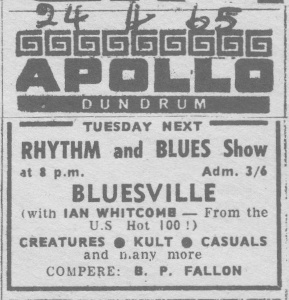
Jerry Dennon then flew to Dublin to oversee the recording of a Bluesville
album. At the end of one of these album sessions the band launched into a
shuffle-beat over which Ian improvised some lyrics including the phrase that
eventually became the song's title "You Turn Me On". Dennon chose this as the
band's next single and his instincts were spot on as it entered the US billboard
Top 10 in July 1965, peaking at #8. Bluesville were the first Irish rock band to
achieve this considerable feat. Ironically, Ian was not that happy with this choice
of single,
preferring the anti-war song "No Tears for Johnny" instead.
The single was quickly followed by the album of the same name featuring the
recordings made in Dublin overseen by Jerry Dennon. Besides the members of
Bluesville, the album also included contributions from Bryan Lynch of
The Greenbeats (on "This Sporting Life", as previously noted),
the departed Barry Richardson, and Peter Adler on sax on selected tracks. It
included covers of "Be My Baby" and "That Is Rock N' Roll" and the afore-mentioned
"No Tears for Johnny". The album is certainly a mixed bag of styles,
some of it bordering on novelty record territory. It reveals that Ian's
singing style is not best suited to rock'n'roll. It was not given a UK
release.
Ian flew back to the USA to promote the single and album leaving the rest of the
band behind. The economic realities of life in Ireland in the mid-60s were such
that not everyone could afford to go. He made numerous US TV appearances
including Shindig! and used local pick up bands for gigs. It was the height of
the British invasion and Ian soon became a heart throb. He signed a management
deal, a solo deal with Tower Records, appeared on national TV, toured, etc.
Another single was taken from the album, "N-N-Nervous" backed by the piano-driven
non-LP track "The End".
When Ian returned to Dublin to sit his finals in the summer of 1965 he was less
than amused to find Bluesville still performing with one of the band members (presumably
Deke) out front doing his "moves". This caused some friction and was effectively the end
of Ian Whitcomb & Bluesville and the beginning of Ian Whitcomb the solo
artist. After sitting his exams he returned to the USA to pursue a teen idol
solo career.
As a footnote, Jerden released one more single credited to Bluesville in late 1965
or early 1966,
"Don't Think Twice It's Alright" (Dylan) / "As Tears Go By" (Jerden 788) but this is in fact
an Ian Whitcomb solo release from the second phase of his career, with no link
to the Dublin band.
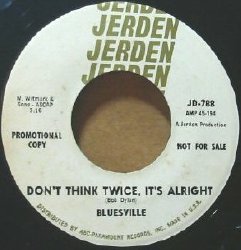
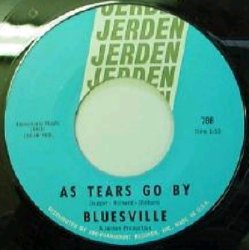
Meanwhile, apart from a brief one-off reunion in 1966 for the Trinity Ball, the
rest of the original Bluesville had split and gone their separate ways. Peter
Adler and Ian McGarry turned up in The Action.
Deke O'Brien joined The Stellas in 1968, and then The Chosen Few;
he and Mick Molloy would later team up again Barry Richardson in Bees Make Honey.
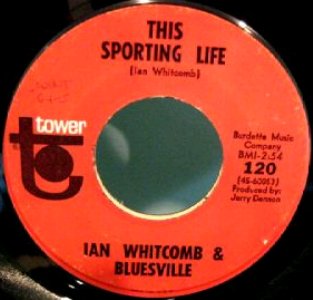
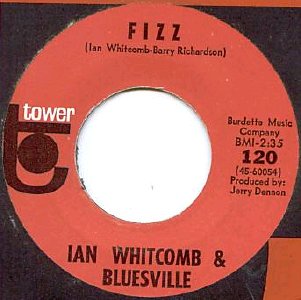
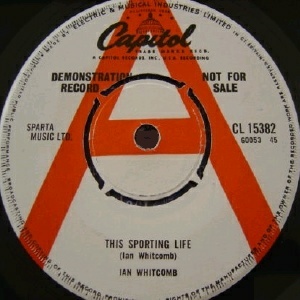
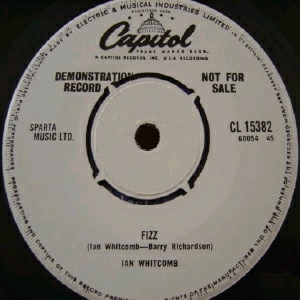
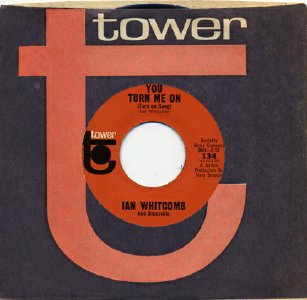
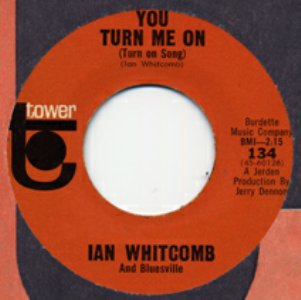
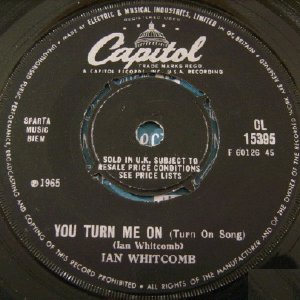
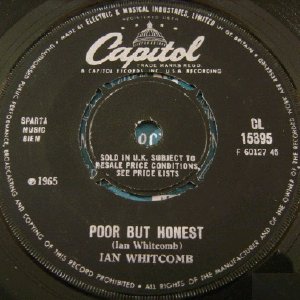
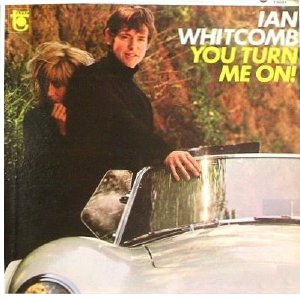
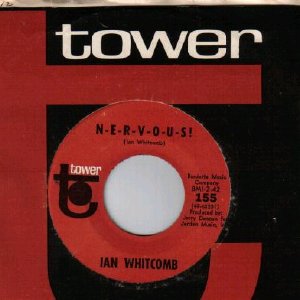
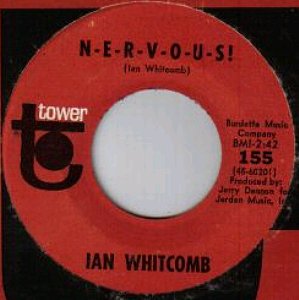
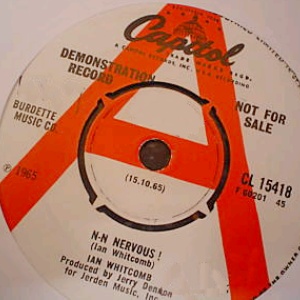
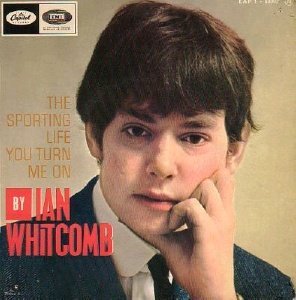
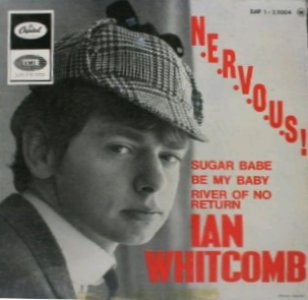
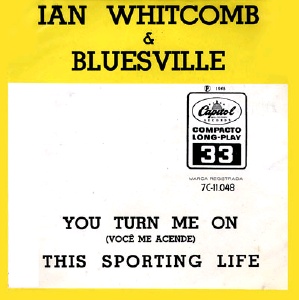
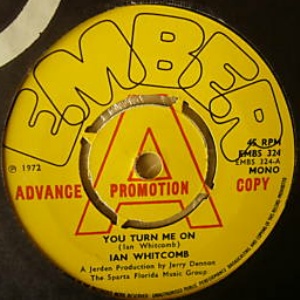
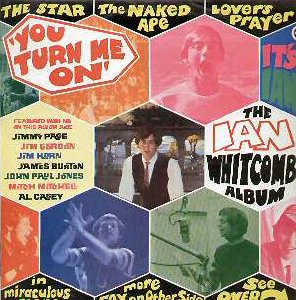
Marketed to cash in on famous session players like Jimmy Page & John Paul Jones of Led Zeppelin plus Mitch Mitchell, Jim Gordon, James Burton and so on. Without detailed sleeve notes it's impossible to be certain, but it looks like two original Bluesville tracks are included.
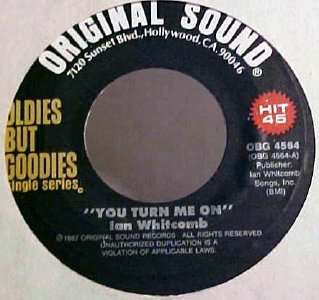
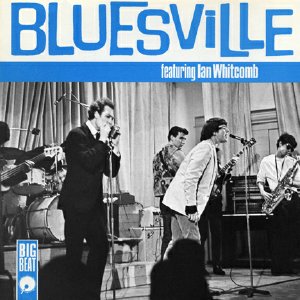
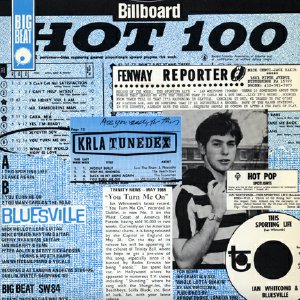
Compilation of tracks recorded at the Eamonn Andrews Studios, Dublin during winter 1964 and spring 1965.
A very nice selection housed in an excellent cover.
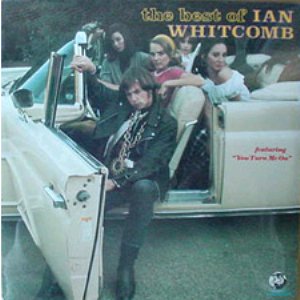
15 songs from 1965-67, including "You Turn Me On," "This Sporting Life" and "Too Many Cars On The Road." The bulk of this compilation consists of the post-1965 vaudevillian tunes recorded in Hollywood with (famous) session musicians.
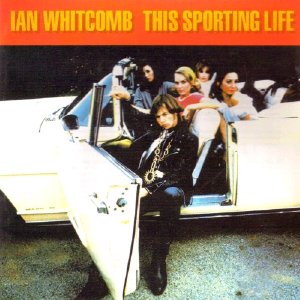
As with the earlier Rhino compilation, the rest of this compilation consists of the post-1965 vaudevillian material.
As with the earlier Rhino compilation, the rest of this compilation consists of the post-1965 vaudevillian material.
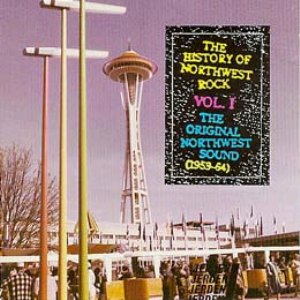
Bio:
Bluesville split in the summer of 1965 by which time Ian Whitcomb had
signed as a solo artist to Tower Records. Without Bluesville backing him,
Whitcomb's interests
in Tin Pan Alley, vaudeville,
English music hall, ragtime, and the ukelele came to the fore and began to dominate his recordings. This
can be considered the second phase of Ian Whitcombs career. While there are
still some interesting tracks (e.g. "Lover's Prayer" with Mitch Mitchell on
drums) the subsequent LPs "Mod, Mod Music Hall" (Tower T5042, Nov 1966),
"Yellow Underground" (Tower ST-5071, 1967) and "Sock Me Some Rock" (Tower ST-
5100, 1968) sound quaint and eccentric today unless you're interested in early 20th
century popular music forms (or are a big fan of Tiny Tim!). All sold poorly but
are still findable on ebay for reasonable prices as they have yet to interest
collectors. There is no link to the original Bluesville band on these records.
Nowadays Ian Whitcomb is a recognised expert on the history of popular music and
has written many books on pre-rock'n'roll musics. He also released many more
albums throught the 1970s and 1980s exploring these musics. These are unlikely
to be of interest to readers but he must surely be credited as a pioneer of
rock'n'roll in Ireland in the early 1960s.

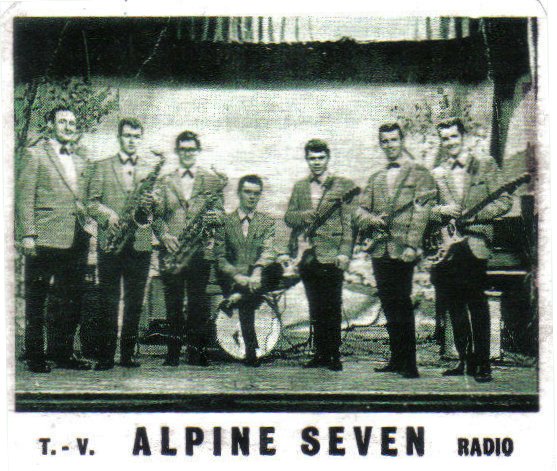
Bio:
The roots of Bluesville. The Alpine Seven were a showband
who began playing R&B under the guise of Bluesville in 1963.
Help!: We need your help to complete this entry. If you can tell us more about this band then please do! We welcome any corrections, missing details, connections to other bands, where are they now, etc. We also need photos, scans, copies of releases or live or demo recordings, and any other memorabilia gathering dust in the attic. If you can help, then please get in touch.
